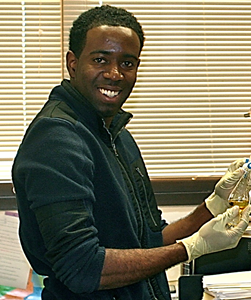
Odaine Gordon, Ph.D.
Department: Pharmacology, 2014
Faculty Mentor: Claus Schneider, Ph.D.
Dissertation Title: Oxidative Transformation of Curcumin: Products and Reaction Mechanisms
Dissertation Abstract: The dietary polyphenol curcumin shows great promise as an anti-cancer and anti-inflammatory agent. While many cellular targets of curcumin have been identified, the chemical mechanisms whereby these targets are affected remain unclear. Orally administered curcumin undergoes metabolic conjugation with glucuronic acid and reduction of the double bonds along the heptadieneone chain. We have recently described oxidative transformation of curcumin in vitro leading to a dioxygenated bicyclopentadione derivative as the final product. We proposed that the oxidative metabolites of curcumin are direct mediators of its biological effects.
I have synthesized [14C2]curcumin and used it to detect and isolate ten novel oxidative transformation products, including four reaction intermediates. The products were identified by UV spectroscopy, mass spectrometry, and a combination of 1D and 2D NMR methods. Mechanistic studies on the incorporation of 2H and 18O into the oxidative metabolites during reactions with 2H2O, H218O, and 18O2, enabled us to determine the mechanism of oxidative transformation of curcumin. I further showed that the phenolic glucuronide of curcumin, a major in vivo metabolite, undergoes enzymatic oxidative transformation in vitro to generate the bicyclopentadione-glucuronide, suggesting the same reaction mechanism as curcumin.
Our studies for the first time determined a complete profile of the products of curcumin oxidative transformation and detailed their mechanisms of formation. The isolation and identification of the oxidative products will allow for future studies in assessing their involvement in the biological activities of curcumin. Implicating the oxidative products as bioactive agents provides a novel paradigm for understanding how curcumin exerts its pleiotropic therapeutic effects. Furthermore, oxidative metabolites of curcumin could represent new lead compounds with improved efficacy, and the possibility to overcome the pharmacokinetic limitations of dietary curcumin.
